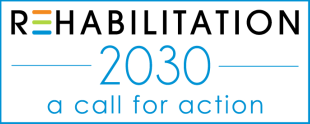
On 6 February this year, the World Health Organization (WHO) launched a new initiative: Rehabilitation 2030 – A Call for Action. This initiative begins with a recognition of the "substantial and ever-increasing unmet need for rehabilitation worldwide". While the WHO has highlighted the particularly pressing need for development of rehabilitation services in low and middle income countries, this call for action is intended for all countries. Even within relatively well-resourced countries, such as New Zealand, access to rehabilitation is often insufficient or restricted by cost. Thus the emphasis of WHO is on accessible and affordable rehabilitation for all people worldwide. This call for action links closely with other WHO objectives around a global strategy for managing our aging populations, the WHO's Mental Health Action Plan, and the push for Integrated People-centered Health Services. The WHO website includes a number of associated resources, including background papers on the need to scale up rehabilitation, the cost of failing to provide rehabilitation, and examples of efforts to implement the WHO recommendations for rehabilitation in Germany, Pakistan, and Philippines.
The WHO writes that “barriers to scaling up rehabilitation indicate a need for greater awareness and advocacy, increased investment into rehabilitation workforce and infrastructure, and improved leadership and governance structures”. They highlight that addressing these barriers to necessary rehabilitation services will required investment of people, finances, and technical tools. They also highlight the need for the political will to make such investments. In New Zealand, actions related to the Rehabilitation 2030 initiative could usefully include:
- Increased advocacy for investment into rehabilitation services nationally
- Better integration of rehabilitation services across primary, secondary, and tertiary care
- Identification and implementation of strategies to address inequities in terms of access to rehabilitation services and outcomes from rehabilitation throughout New Zealand, with a particular focus on the needs of Māori and Pacific peoples.
- Ensuring that specialised rehabilitation services for people with complex needs are available in all District Health Board regions
- Ensuring that rehabilitation services are appropriately financed for the work that is expected and the number of people who need those services.
- Ensuring that all New Zealanders have access to assistive technology and mobility equipment who need them, and that appropriate training and support is provided in the use of this equipment
- Development of more family/whānau centred rehabilitation services
- Provision of advanced clinical training and education to health professionals working in the rehabilitation sector.
So, I encourage you to raise awareness of the Rehabilitation 2030 initiative in your local regions. Get active, get political, and get involved.
William Levack is an Associate Professor of Rehabilitation at the Rehabilitation Teaching & Research Unit, University of Otago, Wellington, New Zealand. Twitter: @DrLevack
More information on the World Health Organization's guidelines on rehabilitation in health systems is available in this video below: